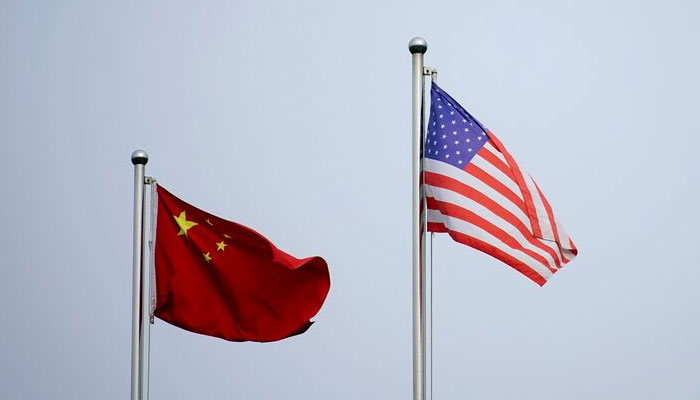Capital suggestion: China or US?
US and China are engaged in a cyber arms race, with each accusing the other of hacking and disinformation campaign
The geopolitical rivalry between the United States and China is intensifying. For Pakistan, this intensification is reducing the scope for neutrality. Consequence 2: Both powers are likely to increasingly seek loyalty and exclusivity. Decision Time: As the competition becomes more acute, Pakistan will face growing pressure to align with one of the two major powers. To avoid being caught between conflicting interests, Pakistan would have to make a definitive choice.
The decision matrix comprises four dimensions: economic interdependence, security implications, domestic politics, and public opinion. Pakistan must carefully weigh the economic benefits against potential risks. Investors and businesses prefer predictability, and a lack of clear direction leads to reduced investment and slower economic growth. Economic history clearly demonstrates that countries attempting to balance economic relations between rival blocs without committing to one side have encountered trade-offs and penalties from both.
Pakistan must evaluate the security threats it faces and ascertain which major power offers the most effective protection. Additionally, Pakistan's decision-makers must meticulously consider the domestic implications of aligning with either China or the US. This assessment should include an analysis of economic impacts, political stability, and public opinion to ensure a well-informed and strategic alignment.
Fact 1: The escalating tensions between the US and China have created a volatile geopolitical landscape. Fact 2: This rivalry is increasingly manifesting in proxy conflicts around the world, fueling instability and increasing the risk of wider-scale confrontation. Fact 3: The Middle East has become a battleground for proxy wars, with the US and its allies supporting one side, while Russia and Iran back opposing factions. Fact 4: Countries such as Syria, Yemen, and Lebanon have been ravaged by these proxy conflicts.
In the Indo-Pacific, the competition between the US and China for influence has intensified, with both powers vying for alliances and military bases in the region. Countries like Taiwan, the Philippines, and Vietnam are caught in the middle of this strategic rivalry.
Africa is increasingly becoming a new frontier for great power competition. Countries like Sudan, the Democratic Republic of Congo, and Mozambique are witnessing growing involvement of external actors, leading to potential proxy conflicts.
Beyond traditional proxy wars, the US and China are engaged in a cyber arms race, with each accusing the other of hacking and disinformation campaigns. This digital battleground can escalate tensions and destabilize global systems.
As a focal point of US-China tensions, Taiwan is particularly vulnerable to cyberattacks, with both nations vying for influence. South Korea is often caught in the crossfire, facing cyber threats from both sides. Japan as a key US ally in the region is a potential target for Chinese cyberattacks. Australia, a close US ally, has faced increasing cyber threats from state-sponsored actors, likely linked to China. Developing countries lack the resources to defend against sophisticated cyberattacks, making them vulnerable to exploitation by both superpowers.
Historical evidence indicates that a nation attempting to maintain neutrality in major international conflicts or disputes will experience pressure from both opposing sides (during the cold war, countries that tried to remain neutral faced economic and political pressures from both the US and the Soviet Union).
A failure to cultivate robust and enduring alliances or strategic partnerships can significantly diminish a state's capacity to withstand external pressures. In the case of Pakistan, such a deficiency could render the nation vulnerable to external aggressions, thereby compromising its national security and sovereignty.
The writer is a columnist based in Islamabad. He tweets/posts @saleemfarrukh and can be reached at: farrukh15@hotmail.com
-
 Jelly Roll Explains Living With 'severe Depression'
Jelly Roll Explains Living With 'severe Depression' -
 Charli XCX Applauds Dave Grohl’s 'abstract' Spin On Viral ‘Apple’ Dance
Charli XCX Applauds Dave Grohl’s 'abstract' Spin On Viral ‘Apple’ Dance -
 Anna Sawai Opens Up On Portraying Yoko Ono In Beatles Film Series
Anna Sawai Opens Up On Portraying Yoko Ono In Beatles Film Series -
 Eric Dane's Wife Rebecca Gayheart Shares Family Memories Of Late Actor After ALS Death
Eric Dane's Wife Rebecca Gayheart Shares Family Memories Of Late Actor After ALS Death -
 Palace Wants To ‘draw A Line’ Under Andrew Issue: ‘Tried And Convicted’
Palace Wants To ‘draw A Line’ Under Andrew Issue: ‘Tried And Convicted’ -
 Eric Dane's Girlfriend Janell Shirtcliff Pays Him Emotional Tribute After ALS Death
Eric Dane's Girlfriend Janell Shirtcliff Pays Him Emotional Tribute After ALS Death -
 King Charles Faces ‘stuff Of The Nightmares’ Over Jarring Issue
King Charles Faces ‘stuff Of The Nightmares’ Over Jarring Issue -
 Sarah Ferguson Has ‘no Remorse’ Over Jeffrey Epstein Friendship
Sarah Ferguson Has ‘no Remorse’ Over Jeffrey Epstein Friendship -
 A$AP Rocky Throws Rihanna Surprise Birthday Dinner On Turning 38
A$AP Rocky Throws Rihanna Surprise Birthday Dinner On Turning 38 -
 Andrew Jokes In Hold As BAFTA Welcomes Prince William
Andrew Jokes In Hold As BAFTA Welcomes Prince William -
 Sam Levinson Donates $27K To Eric Dane Family Fund After Actor’s Death
Sam Levinson Donates $27K To Eric Dane Family Fund After Actor’s Death -
 Savannah Guthrie Mother Case: Police Block Activist Mom Group Efforts To Search For Missing Nancy Over Permission Row
Savannah Guthrie Mother Case: Police Block Activist Mom Group Efforts To Search For Missing Nancy Over Permission Row -
 Dove Cameron Calls '56 Days' Casting 'Hollywood Fever Dream'
Dove Cameron Calls '56 Days' Casting 'Hollywood Fever Dream' -
 Prince William, Kate Middleton ‘carrying Weight’ Of Reputation In Epstein Scandal
Prince William, Kate Middleton ‘carrying Weight’ Of Reputation In Epstein Scandal -
 Timothée Chalamet Compares 'Dune: Part Three' With Iconic Films 'Interstellar', 'The Dark Knight' & 'Apocalypse Now'
Timothée Chalamet Compares 'Dune: Part Three' With Iconic Films 'Interstellar', 'The Dark Knight' & 'Apocalypse Now' -
 Little Mix Star Leigh-Anne Pinnock Talks About Protecting Her Children From Social Media
Little Mix Star Leigh-Anne Pinnock Talks About Protecting Her Children From Social Media




